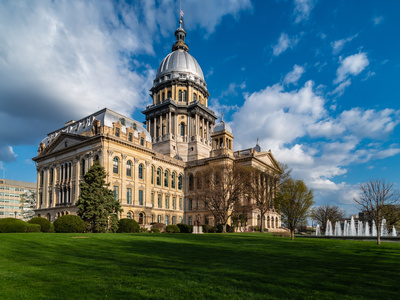-000055-400px.jpeg)
Tax & Budgets, Health Care & Wellness
Here’s How States Are Responding to Trump’s One Big Beautiful Bill Act
October 8, 2025 | Abbie Telgenhof, Morgan Scarboro

Key Takeaways:
In 2019, state lawmakers across the country introduced 25 bills aimed at expanding their sales tax bases to services. While only one of these proposals became law (a Washington Business and Occupation surtax on services), lawmakers’ interest in this topic remains, as evidenced by the number of interim working groups that are considering the issue and the amount of chatter we have heard in state capitols. Below is the list of states that we believe are most likely to introduce taxation of services legislation in 2020.

California: State Senator Bob Hertzberg (D) has been rallying support for a tax on services proposal for a number of years. Given that the 2020 legislative session will almost certainly involve a tax reform discussion sparked by possible changes to Proposition 13, taxation of services could be a major part of those reform discussions.
Kentucky: Kentucky Republicans have shown interest in expanding the sales tax to services for several years. Lawmakers did not make it a front-burner issue in 2019, possibly due to tax fatigue following a major tax reform effort in 2018, but Kentucky Department of Revenue officials and legislators have suggested that another round of sales tax base expansion bills could be considered in 2020. However, those plans could be hampered, given that Governor-elect Andy Beshear (D) said on the campaign trail that he was not in favor of new consumption taxes.
Illinois: The Land of Lincoln is in a uniquely perilous fiscal position with budget deficits and pension liabilities totaling billions of dollars. These conditions, plus the legislature’s increasingly progressive character, means that a major tax shakeup may be coming. While Chicago Mayor Lori Lightfood (D) ultimately only sought to change municipal gambling taxes, she had been signaling an intention to tax services as part of her city’s budget, suggesting that taxation of services is in the ether of Illinois politics.
Nebraska: Politicians in Nebraska have been promising property tax reform for years but have been unable to deliver. In 2019, legislators introduced seven bills that would have taxed services in order to pay for property tax cuts. All of the bills died in committee, but the Platte Institute, an influential think tank founded by Governor Pete Ricketts (R), released a report in October arguing for a base expansion. The governor has also recently said that the passage of property tax reform was “imperative” next session, putting further pressure on lawmakers to deliver in 2020.
North Dakota: During the National Conference of State Legislatures’ (NCSL) State and Local Tax (SALT) Task Force discussion in August, state Senator Dwight Cook (R) expressed his opinion that North Dakota should eliminate the income tax by expanding the sales tax to services. The senator, who chairs the Taxation Committee, is scheduled to leave the legislature at the end of his current term after more than 20 years and says he plans to push hard for these reforms. Neighboring South Dakota already has such a tax regime (broad sales tax and no personal or corporate income taxes).
South Carolina: Before the 2019 session even began, we got word from state lawmakers that they were planning to make a major push to tax services. Their bill (SC HB 4532) ultimately wasn’t introduced until less than two weeks before the end of session and was never heard in committee; however, given that the bill was carefully drafted and sponsored by Senate President Pro Temp Tommy Pope (R), there is every reason to assume the late introduction was strategic and that it will return in 2020.
Utah: Governor Gary Herbert (R) signaled his intention to expand the sales tax to services ahead of the 2019 session and introduced a sweeping reimagining of the sales tax (UT HB 441) in February. The bill died in the face of opposition from the business committee, but the Tax Restructuring and Equalization Task Force has been holding hearings on possible tax on services legislation since May. They have just released a bill outline that would tax a number of new services and eliminate several existing tax exemptions.
Wisconsin: During the NCSL SALT Task Force meeting in August, state Representatives John Macco (R) said that his caucus in the Wisconsin House is working with the Tax Foundation, a D.C.-based think tank, to implement their “Guide to Fair, Simple, Pro-Growth Reform,” which includes taxation of services proposals.
Wyoming: Lawmakers in Cheyenne kicked off the 2019 session with a slate of aggressive tax reform bills, including a taxation of services proposal (WY HB 67), that they hoped would diversify the state’s fiscal portfolio away from its dependence on energy tax revenues. All of the bills died, but the drive to diversify persists. The Joint Revenue Committee has been meeting to discuss these issues and has already decided to recommend a reconsideration of a corporate income tax bill and may also recommend lawmakers reexamine base expansion.
Expanding the sales tax to services is a heavy political lift for state legislatures so the deck is stacked against any one of the states enacting the policy. Despite these headwinds, state lawmakers have continued to discuss the topic suggesting that some are convinced that base expansion is good policy and will bring stability to their state’s tax codes. However, it remains to be seen whether these expansion advocates can generate enough new support from skeptical lawmakers to get a bill signed into law.
-000055-400px.jpeg)
October 8, 2025 | Abbie Telgenhof, Morgan Scarboro

August 5, 2025 | Morgan Scarboro

July 30, 2025 | Bill Kramer